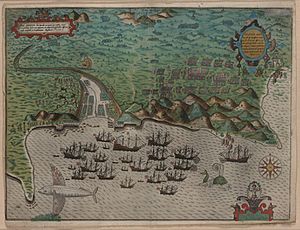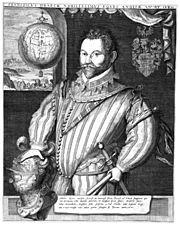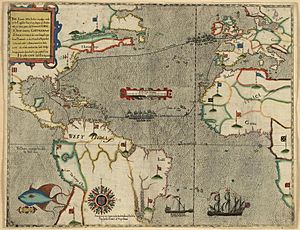Capture of Santiago (1585) facts for kids
Quick facts for kids Capture of Santiago |
|||||||
|---|---|---|---|---|---|---|---|
| Part of the Anglo–Spanish War | |||||||
 Drake at Santiago, Cape Verde, 1589 hand-colored engraving, by Baptista Boazio, 1589 |
|||||||
|
|||||||
| Belligerents | |||||||
|
|
|||||||
| Commanders and leaders | |||||||
| Gaspar de Andrade | Francis Drake Christopher Carleill |
||||||
| Strength | |||||||
| 500 soldiers & militia 3 batteries |
23 ships 1,000 soldiers & sailors |
||||||
| Casualties and losses | |||||||
| Light 8 ships captured |
2 killed | ||||||
The Capture of Santiago was an important event that happened between November 11 and 28, 1585. It was part of the Anglo-Spanish War, which had just started. During this time, an English fleet led by the famous explorer Francis Drake attacked the Cape Verde Islands.
Drake and his men captured the main port town of Cidade Velha. This town was on Santiago, the biggest island in the Cape Verde group. At the time, these islands belonged to Portugal, but they were controlled by Spain. After taking Cidade Velha, Drake's forces also attacked other towns like São Domingos and Praia. This victory was a big success for England.
Contents
Why Did This Happen?
A war had just begun between England and Spain. Philip II of Spain, the King of Spain, declared war on England. This happened after Elizabeth I, the Queen of England, decided to help the Dutch rebels. These rebels were fighting against Spanish rule in the Netherlands.
Queen Elizabeth I wanted to strike first. She ordered Sir Francis Drake to lead a big expedition. His mission was to attack Spanish lands in the New World. This was meant to weaken Spain and protect England.
Drake's Big Journey
Drake's expedition started from Plymouth on September 14, 1585. He had 21 ships and about 1,800 soldiers. Christopher Carleill was in charge of the soldiers.
First, Drake attacked Vigo in Spain. He held the town for two weeks and took supplies. This attack was a trick. Drake wanted Spain to think he was not heading to the Americas. He also showed his presence at Las Palmas in the Canary islands. After getting fresh water at La Gomera, he sailed south. His next target was the Cape Verde Islands.
About the Cape Verde Islands
The Cape Verde Islands were not very rich. They had been Portuguese until 1580, but then Spain took control. Cidade Velha was the main town on Santiago island. It was a key place for the Portuguese slave trade in West Africa. The town also exported sugar and cloth.
Cidade Velha had three forts with many guns. These forts protected the harbor and the land. However, the defenses were old and needed repairs. Drake arrived in early November. He planned his attack carefully. This battle would be a good test for his soldiers.
The Capture of Santiago
On the evening of November 11, Christopher Carleill's soldiers landed on a beach. There were almost 1,000 men. They landed quietly, about four miles east of the town. No one stopped them. They marched through the night towards Cidade Velha.
Taking Cidade Velha
Drake's ships moved into position the next morning. It was the Queen's special day, so he fired cannons to honor her. Then, his ships began firing at the town's defenses. The Spanish and Portuguese fired back, but not for long.
Meanwhile, Carleill's men stormed the forts. They quickly took control of the guns. The people of the town ran away. The English soldiers then rushed into the empty town. Only a few old people and some sick patients were left.
By dawn, the Cross of St George was flying over Cidade Velha. Drake's men searched the town for valuable things. They captured seven Portuguese slave ships in the harbor. One ship was added to Drake's fleet. They took everything useful from the others. They also found a ship being built and took it apart.
The English took old bronze guns and equipment from the forts. They also found gun powder, silk, and cloth in the town's storage buildings. They searched houses for food and picked fruit from the groves. Even the bronze bells from the town's church were taken.
Drake set up his command center. He tried to find the people who had fled. He wanted the island's governor to pay a ransom. If not, he would burn the town. After several days, there was no answer. Drake questioned the few prisoners he had. They told him the governor, Gaspar de Andrade, was in a nearby village called São Domingos.
Marching to São Domingos
Drake and Carleill led 600 men on a tough march. They went into the dry hills of Santiago island. When the English came near, the people of São Domingos also ran away. Drake's men took what little they could find. Then, they burned the village to the ground.
On November 28, Drake tried one last time to get the Spanish governor to pay. He knew about a small town called Praia. He planned to capture that too.
Capturing Praia
Drake sent Carleill on another trip. His men marched nine miles along the coast to the east. They reached Praia.
Carleill's arrival happened at the same time Drake's ships appeared off the town's beach. The 1,000 people living there quickly fled to safety. Drake took control of the town. He ordered it to be burned down, but he spared the town hospital. There wasn't much valuable stuff to take. After that, Drake's men returned to Santiago.
Drake left Santiago just one day after taking Praia. But before he left, he ordered Cidade Velha to be completely destroyed. This was a final message to the governor and the Spanish.
What Happened Next?
At the end of November, Drake's ships sailed west. They headed across the Atlantic Ocean towards the Caribbean. His goal was to attack Spain's rich empire in the New World. Many of his crew got sick from tropical diseases. But Drake still managed to attack three important Spanish cities: Santo Domingo, Cartagena de Indias, and St. Augustine.
After these attacks, Drake sailed north. He found Sir Walter Raleigh's English settlement at Roanoke. He gave them supplies and took some of the colonists back to England. Drake finally arrived back in Portsmouth, England, on July 22. He was welcomed as a hero.
After Drake and the English left, the Spanish and Portuguese made the defenses stronger. By 1590, they built Fort Real de São Filipe. This fort still stands today.
See also
 | Janet Taylor Pickett |
 | Synthia Saint James |
 | Howardena Pindell |
 | Faith Ringgold |



